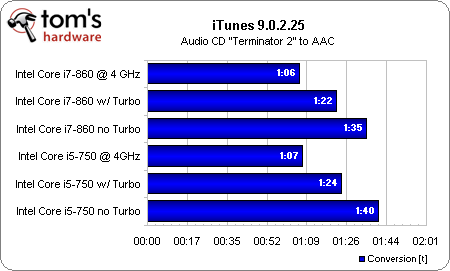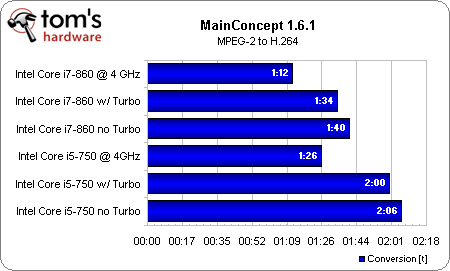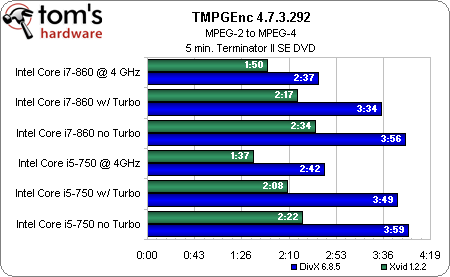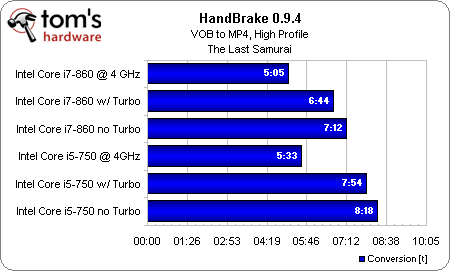Experiment: Does Intel’s Turbo Boost Trump Overclocking?
Benchmark Results: Media/Transcoding Apps
We’ve upgraded our test suite to the latest version of Apple’s iTunes (9.0.2.25), but the program’s behavior remains unchanged. It’s still not optimized for threading, and as a result, Hyper-Threading goes to waste here.
On the other hand, utilization of only one CPU core means Turbo Boost has a fairly profound effect on performance in iTunes. So too does locking each chip’s top speed in at 4 GHz. It’s cool to see theory apply in practice, and that’s what we have here.
Unfortunately, you’ll see that iTunes is the exception in our well-threaded benchmark suite. Let’s move to something a little more parallelized.
MainConcept takes advantage of as many threads as you throw at it. Even still, with Turbo Boost disabled, the Core i5-750 runs at its default 2.66 GHz and the i7-860 is clocked at 2.8 GHz. Although this benchmark is taxing all four cores, operating under its thermal and power ceiling means we still get one bin (133 MHz) of acceleration with Turbo turned on, which is why both CPUs show better numbers with the feature in play.
More so than Turbo Boost, Hyper-Threading gives the Core i7-860 a sizable advantage over the i5-750—proof positive that in well-threaded software, there is a reason to pay a little extra for Hyper-Threading.
Overclocking minimizes the different between the two CPUs, though. At 4 GHz, both shave off significant time off of the stock settings. Of course, the Core i5 sees most of the benefit, since it wasn’t already getting a sizable speed-up via Hyper-Threading.
We compound the results here by mixing a well-threaded DivX codec with a less-optimized Xvid codec.
Get Tom's Hardware's best news and in-depth reviews, straight to your inbox.
As expected Xvid sees no benefit (and, in fact, runs a bit slower) with Hyper-Threading enabled on the Core i7-860 versus Intel’s i5-750. Turbo Boost does help speed things up on both CPUs, though.
Interestingly, DivX doesn’t seem to get anything out of Hyper-Threading either, suggesting its limit is four threads. In this case, the Core i7-860 is a tad faster. And both processors get major speed-ups from overclocking—enough so that it’s clear manual overclocking is the best way to improve the performance of threaded apps that don’t get much benefit from Turbo Boost.
HandBrake is new to our test suite. It’s an open source title, freely available, that’s able to take advantage of threading. In our test, we’re converting the first .vob file on The Last Samurai into an .mp4.
Because it’s threaded, Turbo Boost has little effect here. But again, it’s interesting to see that Hyper-Threading doesn’t make as much of an impact as it did in, say, SiSoftware’s Sandra or 3DMark Vantage’s CPU suite. The real way to fly is using manual overclocking—there’s a huge performance improvement to be had by upping the clocks on both of our tested CPUs.
Current page: Benchmark Results: Media/Transcoding Apps
Prev Page Benchmark Results: Synthetics Next Page Benchmark Results: Productivity-
phantomtrooper No one needs a Core i7 for gaming. I'm still using a e8400 with a gtx275 and I run everything fine at 1080p, even Crysis.Reply -
apache_lives i play GTAIV online alot - your e8400 gets left in the dust there sorry PhantomTrooper, and theres no adverse effects having spare cores for future use with newer games etcReply -
dtemple I second that, PhantomTrooper. I'm on a slightly lower end spec PC than you're using (Athlon 7750 with Radeon HD4830) and with it hooked up to my 1366x768 TV through VGA, everything I play maxes without lag. Mind you, I don't play any titles that are extremely demanding, but I'm playing 2008 and 2009 titles maxed out, on a $60 CPU and an $80 video card.Reply -
curnel_D Great article. On another note, the useless Mass Effect 2 ad blaring it's stupid music in my ears at every new page is really starting to piss me off.Reply -
cangelini Yeah, you guys are going to get a kick out of the upcoming Clarksdale story. It's amazing how badly a Core 2 Duo E8500 gets killed by a Phenom II X4 or Core 2 Quad in some of these more optimized titles.Reply
Curnel--sorry about the ad. I also find it pretty annoying to play automatically every time I open a page for proofing. I'll ask about it. -
HansVonOhain Curnel_DGreat article. On another note, the useless Mass Effect 2 ad blaring it's stupid music in my ears at every new page is really starting to piss me off.Reply
Thanks Chris for your courtesy. -
descendency Curnel_DGreat article. On another note, the useless Mass Effect 2 ad blaring it's stupid music in my ears at every new page is really starting to piss me off.I know it's not a viable solution for all, but I never have my sound on... so I didn't even notice the advert (other than seeing it.)Reply -
gilbertfh I have been building computers for myself family and friends for years and I remember some of the different ways utilized to speed up your computer (including the turbo button on your computer). This method seems like a viable way to speed up computers of those of us that don't really want to overclock.Reply
On a side note: Woot!!! I just saw the Mass Effect 2 ad has been removed. It did have the option to mute it but it was removed fast enough I didn't have a chance to check to ensure it saved to all pages. Thanks Tom's. -
gilbertfh Nope I was wrong I guess it was random and just didn't come up for a while and the mute does not save :(.Reply




